You have not yet added any article to your bookmarks!

Join 10k+ people to get notified about new posts, news and tips.
Do not worry we don't spam!

Post by : Anis Farhan
This week saw a notable rise in bookings at hostels and co‑living properties — not a fleeting spike but evidence of a broader shift in how people combine work and travel. Home desks are giving way to shared work lounges; single-night hotel stays are being traded for week-long communal residencies; and pure holidays are evolving into work-enabled stays that blend productivity with local experience.
For travellers who split time between remote work and exploration, traditional hotels are increasingly a less suitable option. Those planning multi‑day stays now look for reliable work setups, flexible terms and chances to connect. Hostels with dedicated coworking zones, co‑living units with short-term leases, and hybrid hospitality concepts that fuse living, working and community are seeing higher occupancy.
Below we examine what sparked this uptick, how operators are adapting, the implications for travellers and creators, and story angles editors can pursue.
Remote and hybrid arrangements are no longer confined to home offices. Increasingly, workers take their jobs on the road, choosing accommodations that support sustained productivity. Surveys suggest a growing portion of remote‑capable employees plan trips that combine work and leisure — and they target places built for that blend.
Short‑term rental trends indicate guests are booking extended stays when trips include work. Hotels, with higher nightly rates and rigid minimums, often don’t fit those needs. Hostels and co‑living spaces respond with nightly-to-monthly options, communal amenities, and a social setting that suits longer visits.
Today’s travellers seek more than a comfortable room: they want connection, local immersion and meaningful encounters. Many hostels now prioritise experience — coworking corners, curated events and social lounges — while co‑living operators focus on shared kitchens, communal programmes and a sense of temporary belonging.
Longer bookings and bundled services make non‑hotel stays more economical. Co‑living often includes utilities, Wi‑Fi and cleaning as part of rent; hostels have upgraded offerings to appeal to mid‑segment, work‑minded guests. The mix of affordability, convenience and facilities drives the appeal.
Better connectivity, dedicated work areas, contactless check‑ins and flexible durations have made alternatives to hotels viable for remote work. As travellers combine leisure and work and explore secondary destinations, operators have adapted spaces to meet this blended lifestyle.
Many hostels are converting common rooms into coworking hubs, adding meeting booths, improving internet and creating quieter work corners. Co‑living developments incorporate desks, communal work niches and programming designed for productive stays. This week’s bookings suggest such investments are paying off.
To attract hybrid travellers, operators are offering weekly packages, month‑long leases and even flexible nightly options. Some co‑living providers have introduced short‑stay lines tailored to professionals needing a few weeks rather than years of accommodation.
Beyond basic amenities, hostels now run workshops, networking evenings and coworking brunches. Co‑living spaces schedule shared dinners, film nights and cultural activities. These experiences create emotional value and help sustain occupancy.
Properties are merging hostel, co‑living and hotel elements: private short‑stay rooms, shared dorms, coworking desks, cafes and extended‑stay suites under a single roof. Catering to diverse guest profiles has broadened revenue streams and improved fill rates.
While urban centres remain important, many operators are opening in secondary cities, near coworking clusters, and in leisure suburbs that balance work and lifestyle. Recent bookings show travellers are exploring these alternatives more than before.
If you’re combining work with travel for days or weeks, consider hostels or co‑living options that provide:
Reliable, high‑speed internet and defined work areas
Communal spaces alongside private nooks for calls
Transparent, flexible pricing for weekly or monthly stays
Optional community programming and networking opportunities
Locations that balance connectivity with lifestyle amenities
Shared kitchens, communal areas and bundled services reduce living expenses and social isolation. Flexible terms let you relocate if needed — a practical advantage over standard hotels.
Community is valuable, but focused work requires privacy. Confirm that the property offers quiet zones and private spaces for uninterrupted tasks and calls.
Plan work blocks and leisure windows — mornings for focused tasks, afternoons for exploration, evenings for socialising. Hybrid‑friendly properties make this rhythm easier by combining work and leisure facilities.
Prioritise places with good amenities, connectivity and leisure options. The recent uptick in bookings for non‑core cities reflects travellers’ willingness to trade city centre bustle for a balanced lifestyle.
"Hostel bookings climb in [City]: why hybrid workers are picking alternative stays"
"Co‑living emerges as a prime choice for week‑long remote trips"
"Hybrid accommodation: the intersection of hostels and remote work in 2025"
"From backpacker bunk to remote‑work hub: how hostels are evolving"
Potential keywords include: "hybrid work travel accommodation", "remote work hostel trend 2025", "co‑living short stay remote professionals", "hostel bookings spike hybrid workers", "work‑away stays hostels co‑living 2025".
Lead: Describe the weekly surge and the central problem (traditional hotels not meeting new needs).
Context: Outline the broader change in work and travel behaviours.
Case Study: Profile one or two properties with occupancy data and comments from operators or guests.
Traveller Guide: Practical advice on choosing and budgeting for hybrid stays.
Future View: Consider industry implications and destination strategies.
Conclusion: Sum up the changing playbook for travellers and operators.
Use images of coworking corners in hostels, nomads working in shared kitchens, community events at co‑living venues and secondary‑city exteriors to illustrate the blend of work and lifestyle.
Successful remote‑work stays demand more than basic Wi‑Fi: stable connectivity, power resilience, private call spaces and ergonomic workstations. Operators must meet professional expectations and travellers should confirm standards in advance.
Vibrant social programming is attractive but can undermine focus. Properties should clearly separate quiet, communal and private zones. Guests should consult reviews to understand how well a venue manages these boundaries.
Not all locations support a work‑travel balance. Even affordable options in remote areas may lack the amenities and connectivity required for productive stays.
Shorter, flexible stays can cost more per month than long‑term rentals. Understand what’s included — utilities, coworking access and cleaning — when assessing value.
Running hybrid accommodation means juggling diverse guest needs: short‑stayers, remote workers, long‑stay professionals and varied social expectations. Delivering consistent service while preserving community requires careful planning.
Subscription stays: Membership models granting access to hostel and co‑living networks worldwide.
Workation bundles: Packages combining lodging, coworking, local activities and wellness.
Destination spread: Growth in secondary cities and leisure towns positioning themselves as remote‑work hubs.
Corporate partnerships: Firms booking co‑living rather than hotels for visiting or relocating staff.
Deeper tech integration: Seamless booking, digital keys, workspace reservations and service apps embedded in stays.
Monetising community: Revenue beyond beds, from coworking fees, events and food & beverage offerings.
The recent fill‑rates at hostels and co‑living spaces point to a structural change in how people work and travel. The old model — brief hotel stays and inflexible leases — is ceding ground to a new playbook: extended, work‑friendly, community‑oriented stays that prioritise both productivity and place.
For operators, the opportunity is to design spaces that genuinely combine living and working, social and solitary, short visits and longer residencies. For writers and editors, the trend offers rich storytelling: the evolution of accommodation to support the mobile professional, the destinations adapting, and the practical guidance travellers need.
If you’re travelling with work on the agenda, consider options where a productive morning can be followed by an evening exploring the neighbourhood — a stay that’s both practical and part of the experience.
In short: the playbook has changed — where you stay now shapes how you live and work while on the move.
This piece is editorial and informational in nature. It outlines trends in accommodation and travel behaviour and should not replace professional travel planning or personalised accommodation advice.










Study Warns Using AI for Medical Advice Is ‘Dangerous’ as Users Get Inaccurate Health Guidance
A major new study reveals that artificial intelligence (AI) chatbots and tools may give misleading o

Top Sci-Fi Movies Streaming on Netflix This February: Must-Watch Picks for Genre Fans
A curated news-style guide to the best science fiction films currently available on Netflix in Febru

BCCI Central Contracts Shake-Up: Kohli, Rohit Moved to Grade B as Board Reshapes 2025–26 List
Virat Kohli and Rohit Sharma have been placed in Grade B in the BCCI’s 2025–26 central contract list

Dalal Street Spotlight: Top 10 Stocks Investors Are Watching as Markets Open on a High
Indian stock markets begin the week with strong momentum, and several blue-chip and mid-cap stocks a

Market Movers Today: Key Stocks Set To Watch In Indian Markets
Indian equity markets are poised for active trading as several major companies, including Bharti Air

Milan Welcomes the World: Inside the Grand Opening Ceremony of the 2026 Winter Olympics
The 2026 Winter Olympics opening ceremony in Milan marked a defining moment for global sport, blendi